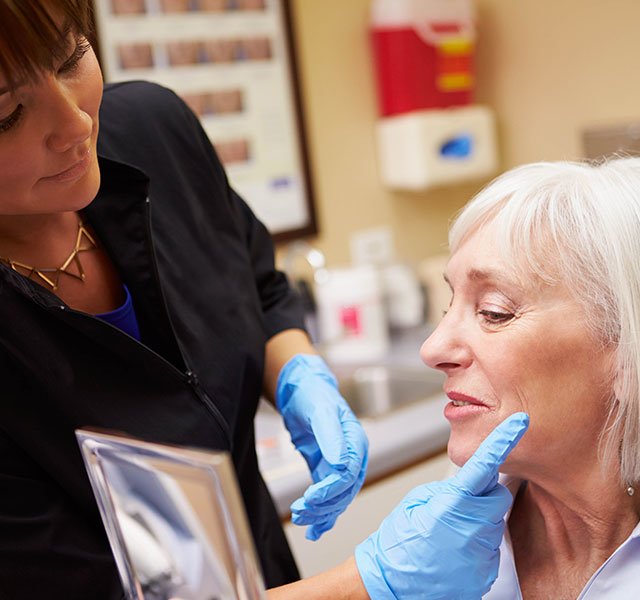The “MediSpa” market has exploded in recent years, and it’s not hard to see why. Advertised as a mix between a medical clinic and a spa, today’s MediSpas offer traditional spa services (mani/pedis, facials and massage) alongside promises of younger-looking skin, fewer age spots and hair-free bikini lines. Add to that easy access to procedures like Botox and laser hair removal — treatments once only performed by doctors — and it’s certainly tempting to believe these facilities can offer the best of both worlds.
“You develop a certain level of trust when you see someone in scrubs or a white coat,” says Donna Tepper, M.D. FACS, a plastic and reconstructive surgeon with Henry Ford Health. “That attire serves as a symbol that the person has acquired a certain level of knowledge and experience.”
The truth: Most MediSpa staff have limited medical experience. So while you may be tempted by the latest Groupon to try your local MediSpa, consider these 10 secrets spa directors may not want you to know:
- There may not be a physician on site. Even though a doctor must serve as medical director, he or she may “supervise” from a medical office miles away. Unlike physician offices where clinicians oversee treatments and maintain medical records, MediSpas have limited or no medical staff. The end result: There may not be a doctor around when problems arise.
- Consider who is a “medical aesthetician.” Many MediSpas say their procedures are performed by medical aestheticians, or skin care specialists. Aestheticians require only 400 hours of training. “And those hours can include previous job experience,” says Tepper. After completing cosmetology school for training in hair, nails and makeup, aestheticians receive training in facials, massage and waxing. Then, after completing additional course training in laser and injections, they’re able to call themselves “advanced aestheticians.” “That means most MediSpa staff are performing potentially dangerous treatments with limited medical experience,” says Tepper.
- The supervising doc may not have the experience or training needed. With lower reimbursement rates from medical insurance, a growing number of physicians are serving as MediSpa directors to boost their bottom line. “So while your spa’s director may hold a medical license, if they don’t specialize in the field of practice in which they are performing procedures, odds are they aren’t adequately trained to address problems that arise from spa treatments,” says Tepper. Your best bet: Seek cosmetic treatments from board-certified physicians that specialize in skin care, cosmetic, plastic or facial plastic surgery.
- Laser equipment is expensive. Laser technology has evolved dramatically over the past decade with different devices designed for hair removal, skin resurfacing and spot removal. But with a machine that uses a handheld device costing more than $100,000, a MediSpa needs to have clients to pay for it. Be sure that you are not the first to “try out” the newest services. Request to see pictures of the spa’s own patients that have undergone the treatment, not just brochures from the machine’s manufacturer.
- Even if the spa owns the appropriate lasers, staff may lack the skills to deliver treatments. Lasers are high-powered devices with the ability to damage your eyes and permanently scar your skin. And while you cannot purchase a laser without a medical license, some technicians who perform laser or injectable treatments may have limited medical training. In the wrong hands, the powerful light pulses from lasers can cause burns, scarring and pain.
- MediSpa staff aren’t trained to spot cancer. A pesky pimple or unsightly mole may be more than just a cosmetic concern. Board-certified dermatologists, plastic and facial plastic surgeons are trained to identify and remove potentially cancerous lesions—and send the tissue to an appropriate lab for diagnosis. An aesthetician with limited knowledge of skin lesions may miss this.
- MediSpas don’t have the same regulations. MediSpas are not held to the same standard as a free standing accredited medical or surgical facility. For spas offering treatments outside of a physician’s office, there are different safety standards that do not measure up to those needed in a more credentialed medical facility.
- Counterfeit Botox is real. Think you’re getting a steal on Botox treatments? Think again. A super low price may be a sign that you are getting swindled. “Botox and other injectables, such as Juvederm, Restylane and Radiesse, have been sold as counterfeit products,” explains Tepper. “Reputable spas and physician offices will not be lured into these tampered products. But remember they are out there.”
- The person injecting your filler may earn $13 per hour. Many people may not know the skills or training level of the person who injects them with Botox. But injected incorrectly, Botox or dermal fillers, such as Juvederm Voluma, Restylane and Radiesse, are far more risky. “If filler is injected around the eyes or between the eyes, there is a higher risk for injection into a blood vessel, causing blindness,” says Tepper. “Botox, when injected too close to the eyebrow, can cause drooping brows that will last four months. There is no correction for this latter issue but time.”
- Even a simple manicure or facial can have health consequences if a technician isn’t properly trained or a facility follows unsafe or unsanitary practices. Do your homework before you sign up for a service, and make sure the spa you’re visiting has the appropriate licensing.
Not all MediSpas are danger zones, of course, especially for typical spa-type treatments but if you’re seeking “medical treatments,” including fillers, Botox, laser hair removal or deeper peels, make sure a physician oversees the procedure. And before you make an appointment for your next day of primping, be sure to get a referral from your doctor, read online reviews and ask questions about the staff’s education and experience. The top three on your list should be:
- Will a physician be on site during the treatment?
- What are the supervising physician’s credentials? (Injectables, laser treatments and deep peels should be done under the direction of a board-certified plastic or facial plastic surgeon or a board-certified dermatologist.)
- Who do I call if I have a reaction or an issue in the middle of the night? (If the answer is go to the emergency room, find another spa. Better yet, see a physician with experience in the treatment you’re looking for.)
Learn more about dermatology and skin care and plastic surgery at Henry Ford. To make an appointment with a skin care professional, call 1-800-HENRYFORD (436-7936) or visit henryford.com.
Dr. Donna Tepper is a senior staff plastic and reconstructive Surgeon with Henry Ford Health, who sees patients at Henry Ford Hospital in Detroit and at Henry Ford Medical Centers in Dearborn, Grosse Pointe Farms and Novi.



